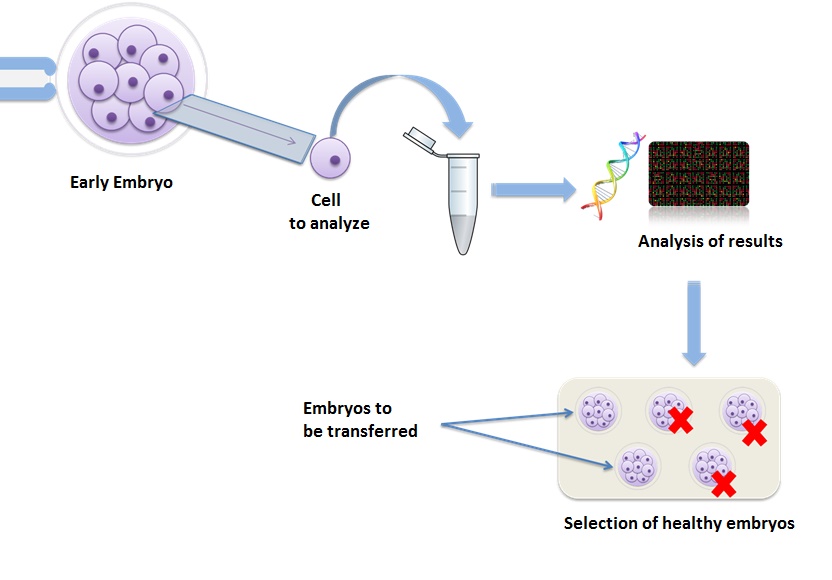Preimplantation genetic diagnosis (PGD) is a reproductive technology used with an IVF cycle to increase the potential for a successful pregnancy and delivery. This diagnosis allows the diagnosis of abnormalities or genetic characteristics in embryos, prior to their transfer to the maternal uterus.
How is the genetic analysis of the embryo performed?
To make this diagnosis possible, an early embryo sample is required. Therefore, after performing the appropriate in vitro fertilization (IVF) procedure, an embryo biopsy is performed to remove one or more cells from the embryo. The genetic information of that cells will be analyzed by the clinical genetics department.
Who should consider PGD?
Those who might benefit most from this test are couples at increased risk for chromosome abnormalities or specific genetic diseases. This includes women who have had several miscarriages, repeated implantation failures, elderly women who want to be mothers, or couples who, given their family history, want to avoid transmitting certain hereditary genetic diseases to their children.
This last situation is the case of our first patients who requested a preimplantation genetic diagnosis.
Our experience:
At first, we find a young couple, both under 30, whose problem is not infertility. However, being aware of a genetic alteration present in the family of the male, they want to prevent the transmission of the alteration to their future children.
The genetic alteration of the male is a balanced translocation between two of its chromosomes (4 and 17), making him phenotypically normal. This means that he does not manifest any type of pathology due to the alteration. Nevertheless, although other family members have a normal genotype or they do not show abnormalities, the sister of the male presents a partial trisomy of chromosome 4 caused by an unbalanced translocation of the chromosomes, which causes intellectual or developmental disability. For this reason, they request our services.
In a natural pregnancy or without making a genetic diagnosis, the couple could have healthy children in a very low probability, that is, without the genetic alteration or presenting the balanced alteration as in the case of the male. But they may also have children who have unbalanced partial trisomy, which would mean the manifestation of a serious illness.
By carrying out the genetic diagnosis, we can select healthy embryos and transfer them to the woman’s uterus, in this case with successful results.
At present, the couple is waiting for the birth of their child, thanks to the use of these techniques. For our part we greatly appreciate their trust in our team to make their dream come true.
Of course, we are available for any consultation of couples who are in a similar situation and we encourage you to contact us if you wish. You can also find more detailed information about this and other techniques on our website.
Phi Fertility
C.Orjuela, Embryologist.
Contact us.
Vithas Perpetuo Internacional. Plaza del Doctor Gómez Ulla 15, Alicante.
Phone number: 965230397 / +34 606437458
Email: info@phifertlity.com
You can follow our publications and news through our social networks: Facebook and Twitter.




